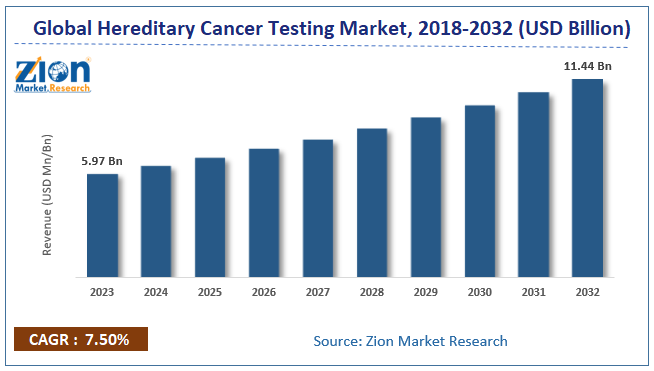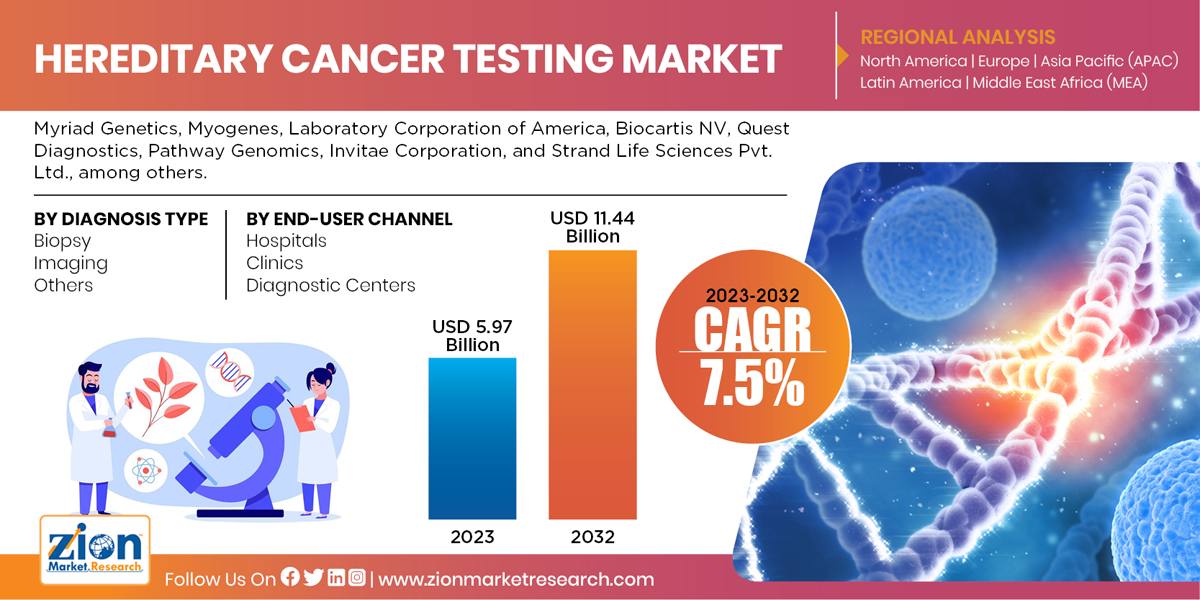Hereditary Cancer Testing Market Trend, Share, Growth, Size, Analysis and Forecast 2032

Hereditary Cancer Testing Market by Diagnosis Type (Biopsy, Imaging and Others), By End-User (Hospitals, Clinics, and Diagnostic Centers), and by Region: Global Industry Perspective, Comprehensive Analysis, and Forecast, 2024-2032
| Market Size in 2023 | Market Forecast in 2032 | CAGR (in %) | Base Year |
|---|---|---|---|
| USD 5.97 Billion | USD 11.44 Billion | 7.5% | 2023 |
Hereditary Cancer Testing Market: Industry Prospective
The global Hereditary Cancer Testing market size accrued earnings worth approximately USD 5.97 Billion in 2023 and is predicted to gain revenue of about USD 11.44 Billion by 2032, is set to record a CAGR of nearly 7.5% over the period from 2024 to 2032.
Hereditary Cancer Testing Market Outlook
Cancer takes place due to an inherited mutation called as hereditary cancer. Hereditary cancer testing is a process that identifies an inherited gene mutation that increases the risk of cancer development. Hereditary cancer testing majorly covers predictive genetic testing and clinical DNA sequencing. In predictive genetic testing, the patient’s family history is analyzed for inherited mutation from ancestry. It is useful for testing many genetic mutations at a time.
Hereditary cancer testing is similar to other cancer testings and it includes lab tests, imaging procedures, and biopsy. This test does not diagnose whether a person is suffering from cancer it only recognizes if a person is bearing a change in genes which increases the risk of cancer.
Hereditary Cancer Testing Market Growth Dynamics
Growing demand for non-invasive techniques for detection of hereditary cancer is the major driver of the hereditary cancer testing market. According to CDC (Centers for Disease Control and Prevention), over 200,000 women in the U.S. are diagnosed with breast cancer and more than 20,000 are diagnosed with ovarian cancer each year. Whereas, 3% of breast cancer and 10% of ovarian cancer are caused due to inherited mutations. Ovarian cancer, pancreatic cancer, bowel cancer, breast cancer, kidney cancer, thyroid cancer, melanoma, prostate cancer, retinoblastoma, womb cancer, and other types of cancer are tested by using hereditary cancer testing. In addition to the increased requirement for non-invasive techniques for discovery of hereditary cancer, growing government funding for improvement of rapid diagnostics, and concerns related hereditary cancer are also resulting in increased demand for hereditary cancer testing market. The inevitable need for avoiding cancer in coming future is likely to boost the demand for hereditary cancer testing market in the coming years. As the demand for non-invasive techniques is increasing histopathological detection still acts as a golden standard for identification of hereditary cancer.
In order to give the users of this report a comprehensive view of the hereditary cancer testing market, we have included competitive landscape and analysis of Porter’s Five Forces model of the market. The study encompasses a market attractiveness analysis, where diagnosis type, end-user, and regional segmentation are benchmarked based on their market size, growth rate, and general attractiveness.
Hereditary Cancer Testing Market: Report Scope
| Report Attributes | Report Details |
|---|---|
| Report Name | Hereditary Cancer Testing Market |
| Market Size in 2023 | USD 5.97 Billion |
| Market Forecast in 2032 | USD 11.44 Billion |
| Growth Rate | CAGR of 7.5% |
| Number of Pages | 204 |
| Key Companies Covered | Myriad Genetics, Myogenes, Laboratory Corporation of America, Biocartis NV, Quest Diagnostics, Pathway Genomics, Invitae Corporation, and Strand Life Sciences Pvt. Ltd., among others. |
| Segments Covered | By Diagnosis Type, By End-User Channel, and By Region |
| Regions Covered | North America, Europe, Asia Pacific (APAC), Latin America, Middle East, and Africa (MEA) |
| Base Year | 2023 |
| Historical Year | 2018 to 2022 |
| Forecast Year | 2024 - 2032 |
| Customization Scope | Avail customized purchase options to meet your exact research needs. Request For Customization |
The report provides company market share analysis in order to give a broader overview of the key players in the market. In addition, the report also covers key strategic developments in the market, including acquisitions & mergers, new product type launch, agreements, partnerships, collaborations & joint ventures, research & development, regional expansion of major participants involved in the market in global and regional basis.
Hereditary Cancer Testing Market Segmentation Analysis
The study provides a decisive view of the hereditary cancer testing market by segmenting the market based on diagnosis type, end-user, and regions. All the segments have been analyzed based on present and the future trends and the market is estimated from 2024 to 2032.
Based on diagnosis type, the hereditary cancer testing market is segmented as biopsy, imaging, and others. Based on end-user, the hereditary cancer testing market is segmented as hospitals, clinics, and diagnostic centers.
Growing demand for non-invasive techniques for detection of hereditary cancer coupled with government funding for improvement of rapid diagnostics and rising concerns of hereditary cancer are the major driving factors of hereditary cancer testing market. Difficulties in accessing the complete genomic data for early detection and prevention will influence the market growth during the forecast period.
Regional Analysis
By geography, North America dominates the hereditary cancer testing market due to the high prevalence of cancer among the population coupled with presence of many dominant players located in the U.S. Emerging regions such as the Asia Pacific is also experiencing a major outbreak due to raising awareness among people about cancer, which is projected to offer several opportunities to the hereditary cancer testing market. These all factors are likely to drive the Asia Pacific market in the near future. Latin America and the Middle East and Africa is another key regional market and is expected to grow moderately in the coming years owing to rising healthcare infrastructure, increasing awareness among the people, and changing government policies in these regions.
The report also includes detailed profiles of end players such as
- Myriad Genetics
- Myogenes
- Laboratory Corporation of America
- Biocartis NV
- Quest Diagnostics
- Pathway Genomics
- Invitae Corporation
- and Strand Life Sciences Pvt. Ltd.
- among others.
This report segments the global hereditary cancer testing market as follows:
By Diagnosis Type
- Biopsy
- Imaging
- Others
By End-User Channel
- Hospitals
- Clinics
- Diagnostic Centers
By Region
- North America
- The U.S.
- Europe
- UK
- France
- Germany
- Asia Pacific
- China
- Japan
- India
- Latin America
- Brazil
- The Middle East and Africa
Table Of Content
Methodology
RelatedNews
HappyClients
Zion Market Research
Tel: +1 (302) 444-0166
USA/Canada Toll Free No.+1 (855) 465-4651
3rd Floor,
Mrunal Paradise, Opp Maharaja Hotel,
Pimple Gurav, Pune 411061,
Maharashtra, India
Phone No +91 7768 006 007, +91 7768 006 008
US OFFICE NO +1 (302) 444-0166
US/CAN TOLL FREE +1 (855) 465-4651
Email: sales@zionmarketresearch.com
We have secured system to process your transaction.
Our support available to help you 24 hours a day, five days a week.
Monday - Friday: 9AM - 6PM
Saturday - Sunday: Closed







